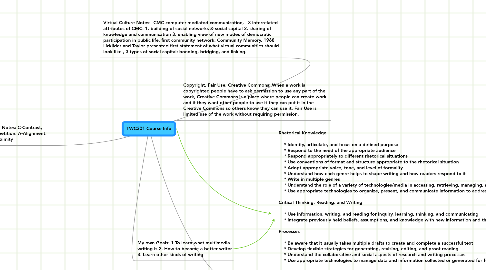TWC301 Course Info
by April Gallegos

1. My own Goals: 1.To learn what multimedia writing is 2. How to become a better writer 3. Learn other kinds of writing
2. Virtual Culture Notes: -CMC computer-mediated communication, - 3 interrelated attributes of CMC: 1. building of social networks & social capital 2. sharing of knowledge and communication 3. enabling view of new modes of democratic participation in public life, first community network: Community Memory, 1968 Licklider and Taylor presented first statement of what virtual communities should look like , 3 types of social capital: bonding, bridging, and linking.
3. CRAP Notes: C-Contrast, R-Repetition, A-Alignment, P-Proximity
4. Rhetorical Knowledge * Identify, articulate, and focus on a defined purpose * Respond to the need of the appropriate audience * Respond appropriately to different rhetorical situations * Use conventions of format and structure appropriate to the rhetorical situation * Adopt appropriate voice, tone, and level of formality * Understand how each genre helps to shape writing and how readers respond to it * Write in multiple genres * Understand the role of a variety of technologies/media in accessing, retrieving, managing, and communicating information * Use appropriate technologies to organize, present, and communicate information to address a range of audiences, purposes, and genres Critical Thinking, Reading, and Writing * Use information, writing, and reading for inquiry, learning, thinking, and communicating * Integrate previously held beliefs, assumptions, and knowledge with new information and the ideas of others to accomplish a specific purpose within a context Processes * Be aware that it usually takes multiple drafts to create and complete a successful text * Develop flexible strategies for generating, revising, editing, and proof-reading * Understand the collaborative and social aspects of research and writing processes * Use appropriate technologies to manage data and information collected or generated for future use Knowledge of Conventions: * Learn common formats for different genres * Develop knowledge of genre conventions ranging from structure and paragraphing to tone and mechanics * Understand and apply legal and ethical uses of information and technology including copyright and intellectual property
5. Copyright, Fair Use, Creative Commons: When a work is copyrighted people have to ask permission to use any part of the work, Creative Commons is a place where people can create work and if they want other people to use it they can put it in the Creative Commons so others know they can use it, Fair Use is limited use of the work without requiring permission.


